DCHP-2
icewine ice wine DCHP-2 (October 2016)
n. — Food & Drink
a sweet wine made from grapes that are left to freeze on the vine and are harvested and pressed while frozen.
Type: 4. Culturally Significant — Icewine, known as "Eiswein" in Germany where it is reported to have originated, was first produced in Canada in 1973 (Schreiner 2001: 151). The climates of certain regions of Ontario and BC are ideal for producing icewines, a circumstance which has given Canada great prominence in the international icewine market. True icewine is processed based on strict standards, e.g. the grapes must be picked at a temperature of -8 degrees celsius or lower (see VQA Ontario reference). Canada is one of very few countries in the world where climatic conditions favour the production of icewine. In other locations, icewines may be made artificially by freezing the grapes after harvesting.
According to Schreiner (2001: 11), icewines were first produced about 200 years ago in Germany, but it was only when Canadian wineries began producing icewines in the 1990s that "consumers and the wine trade took notice" of the dessert wine that would become "Canada's signature wine" (Schreiner 2001: 163). Canada's Inniskillin winery, based in BC and Ontario, is also the world's largest icewine producer (Schreiner 2001: 17) and has won several international awards for its ice wines (see Inniskillin Winery reference).
The spelling icewine is the preferred Canadian spelling, as in other locations the spelling is generally ice wine (see Charts 1 and 2), which makes icewine a Canadianism on the grounds of frequency as well.
See also COD-2, s.v. "icewine" (1), which is marked "esp. Cdn".See also: VQA
References:
- COD-2
- Inniskillin Winery "Awards" Accessed 27 Aug. 2013
- Schreiner (2001)
- VQA Ontario "Icewine" Accessed 6 Aug. 2013
Images:
Chart 1: Internet Domain Search, 14 Aug. 2012
Chart 2: Internet Domain Search, 14 Aug. 2012

